South Africa's poor scramble for anti-HIV drugs amid virus
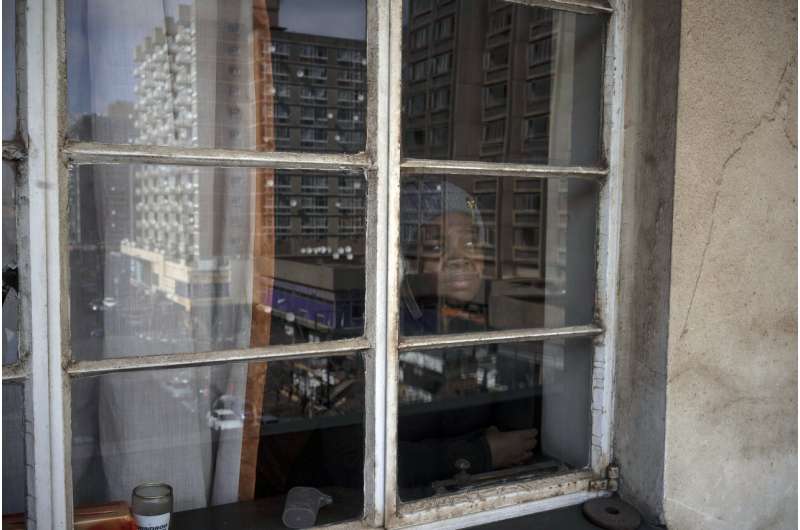
When her regular clinic ran out of her government-funded HIV medications amid South Africa's COVID-19 lockdown, Sibongile Zulu panicked. A local pharmacy had the drugs for $48, but she didn't have the money after being laid off from her office job in the shutdown to slow the spread of the coronavirus.
Desperate for the lifesaving medication, the single mother of four called a friend—a nurse with a local charity helping people with HIV, the Sister Mura Foundation. She's one of the lucky ones: Since April, the foundation has provided Zulu with the drugs, purchased locally.
Across South Africa and around the world, the pandemic has disrupted the supply of antiretroviral drugs, endangering the lives of many of the more than 24 million people globally who take the medications that suppress the HIV virus.
In sub-Saharan Africa alone, hampered by the pandemic, risking the lives of many of South Africa's neediest citizens, health experts say.
"Disruptions to these medications is a public health problem. It threatens the poor and most vulnerable," said Vinyarak Bhardwaj, deputy director of Doctors Without Borders' program in South Africa, which has HIV programs in the Western Cape and KwaZulu-Natal provinces.
"We're responding to this threat by helping to minimize shortages and by providing stable HIV patients with multi-month prescriptions to limit their visits to the clinics. We're also increasing treatment advice by telephone and the internet," he said.
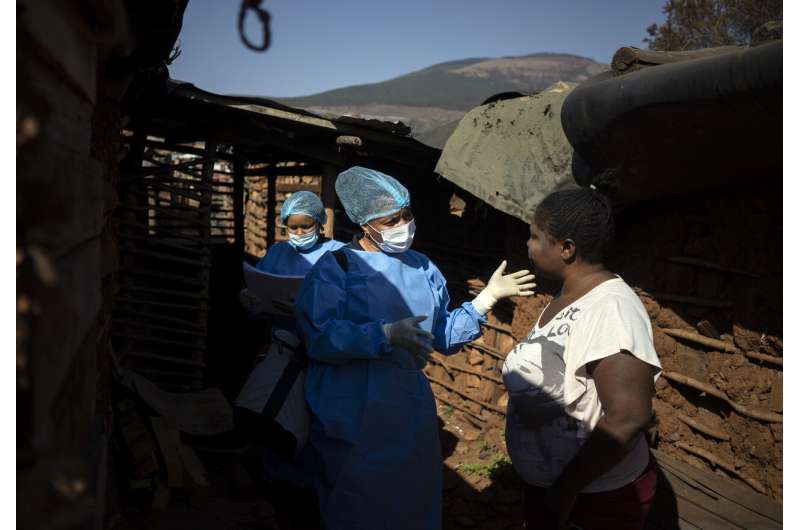
Reliable supplies of antiretroviral drugs are so critically important in South Africa that a monitoring program, Stop Stockouts, was created in 2013 and is closely tracking and responding to the disruptions amid the COVID-19 pandemic.
The mill town of Ngodwana in the country's northeast, a truck stop on the highway to Mozambique, is a microcosm of South Africa's inequality, rated as the world's highest.
Ngodwana's 3,500 residents are mostly Black, living in a densely packed shantytown, with limited electricity and running water. Safe distancing is nearly impossible. Years ago, the truck traffic was blamed for bringing HIV to the area; now come fears it will become a hot spot for COVID-19.
Many in Ngodwana can no longer afford to travel the 40 kilometers (25 miles) to the town of Nelspruit to get their drugs and don't feel comfortable going to the crowded local clinic. So the Dutch-based aid group North Star Alliance set up a tented drop-in center and started home visits.
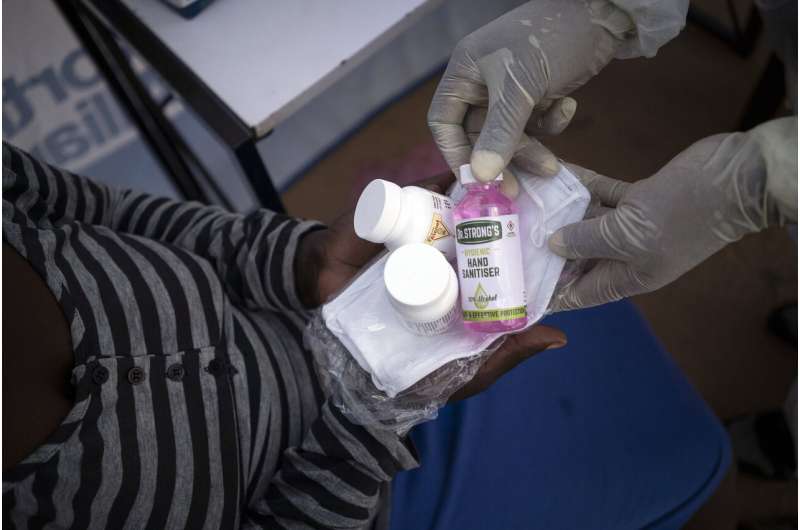
Clad in a mask, gloves and protective surgical gown, nurse Nomautanda Siduna walked through Ngodwana's dirt streets to a mud-walled, tin-roofed home. Once inside, she quickly got to work, distributing a two-month supply of antiretroviral drugs to the HIV-positive woman, a sex-worker, and advising her how to stay as safe as possible amid the pandemic.
"You must know that with COVID out there, you must take your treatment, every day, same time, like you're always doing," Siduna told her. "And you must use a condom when you're sleeping with anyone."
Pretty Mkhabela, 34, said the pandemic frightens her and that she's taking new precautions as a sex worker.
"Yes, I'm scared," Mkhabela said. "When I work with my client, I use a mask and my client also uses a mask."
Another resident, Rose Khondowa, tried to get her antiretroviral drugs by traveling to Nelspruit, but encountered only a locked gate after a COVID-19 outbreak among hospital workers caused the clinic to temporarily close. She didn't have enough money, about $4, for a second trip.
-
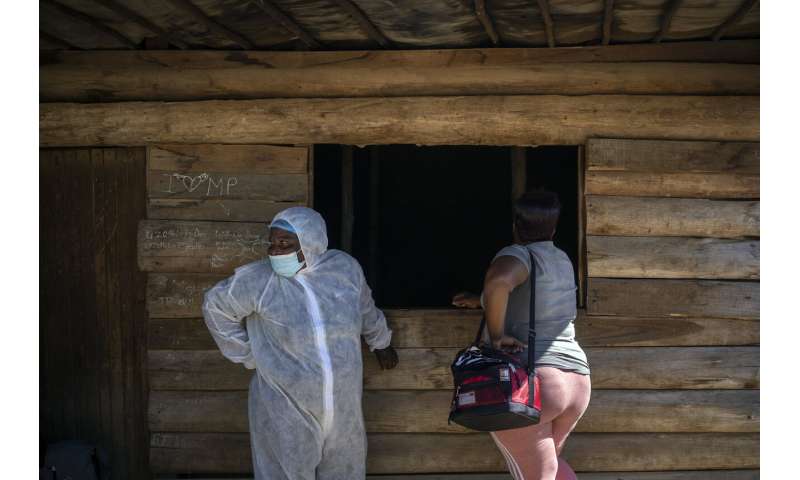
A nurse stands next to a sex worker outside a mobile HIV clinic in Ngodwana, South Africa, Thursday, July 2, 2020. Across Africa and around the world, the COVID-19 pandemic has disrupted the supply of antiretroviral drugs to many of the more than 24 million people who take them, endangering their lives. An estimated 7.7 million people in South Africa are HIV positive, the largest number in the world, and 62% of them take the antiretroviral drugs that suppress the virus and prevent transmission. (AP Photo/Bram Janssen) -
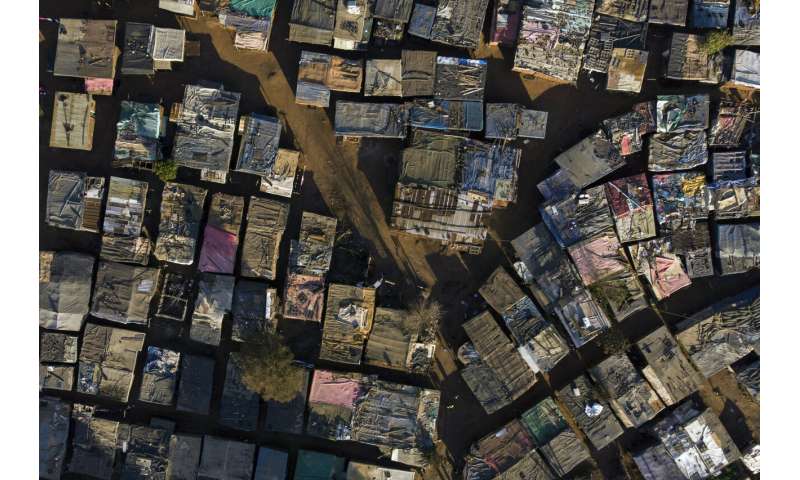
This aerial photo shows the an informal settlement in Ngodwana, South Africa, Thursday, July 2, 2020. Across Africa and around the world, the COVID-19 pandemic has disrupted the supply of antiretroviral drugs to many of the more than 24 million people who take them, endangering their lives. An estimated 7.7 million people in South Africa are HIV positive, the largest number in the world, and 62% of them take the antiretroviral drugs that suppress the virus and prevent transmission. (AP Photo/Bram Janssen) -
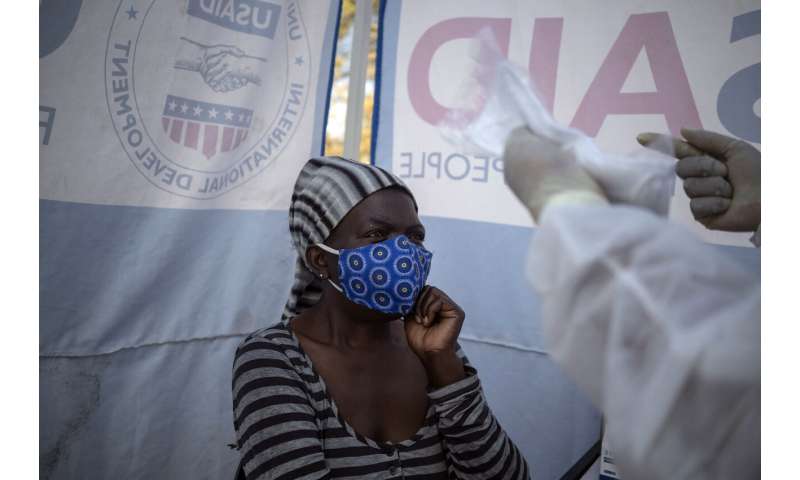
A woman who is HIV-positive receives her antiretroviral drugs inside a gazebo used as a mobile clinic in Ngodwana, South Africa, Thursday, July 2, 2020. Across Africa and around the world, the COVID-19 pandemic has disrupted the supply of antiretroviral drugs to many of the more than 24 million people who take them, endangering their lives. An estimated 7.7 million people in South Africa are HIV positive, the largest number in the world, and 62% of them take the antiretroviral drugs that suppress the virus and prevent transmission. (AP Photo/Bram Janssen) -
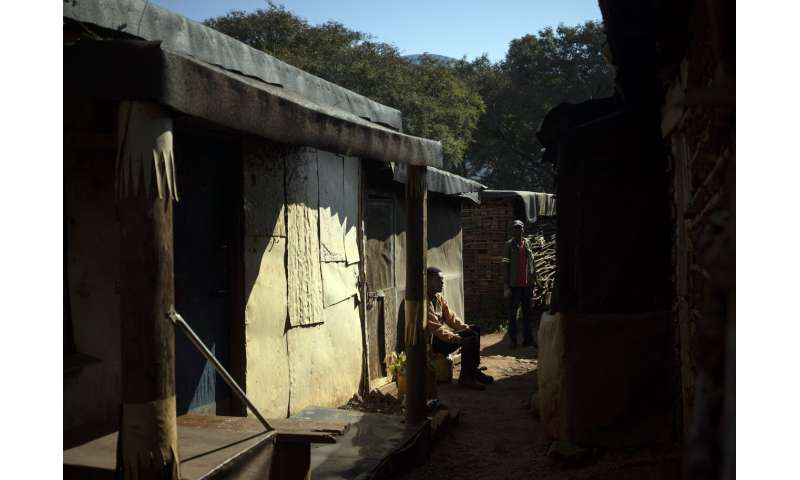
A man sits on a chair in an informal settlement in Ngodwana, South Africa, Thursday, July 30, 2020. Across Africa and around the world, the COVID-19 pandemic has disrupted the supply of antiretroviral drugs to many of the more than 24 million people who take them, endangering their lives. An estimated 7.7 million people in South Africa are HIV positive, the largest number in the world, and 62% of them take the antiretroviral drugs that suppress the virus and prevent transmission. (AP Photo/Bram Janssen) -
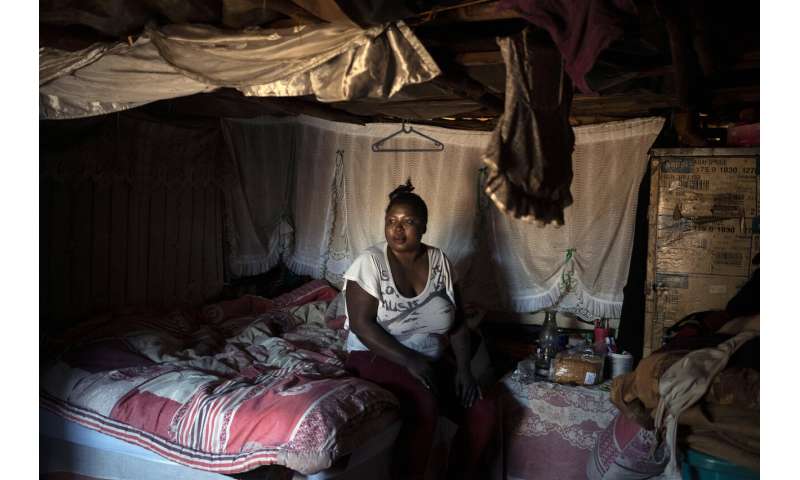
Pretty Mkhabela, a HIV-positive sex worker, sits inside her house in Ngodwana, South Africa, Friday, July 3, 2020. She gets her antiretroviral drugs delivered to her house by as part of a campaign to make sure that the treatment of South Africa's HIV positive population is maintained during the COVID-19 pandemic. Across Africa and around the world, the COVID-19 pandemic has disrupted the supply of antiretroviral drugs to many of the more than 24 million people who take them, endangering their lives. An estimated 7.7 million people in South Africa are HIV positive, the largest number in the world, and 62% of them take the antiretroviral drugs that suppress the virus and prevent transmission. (AP Photo/Bram Janssen) -
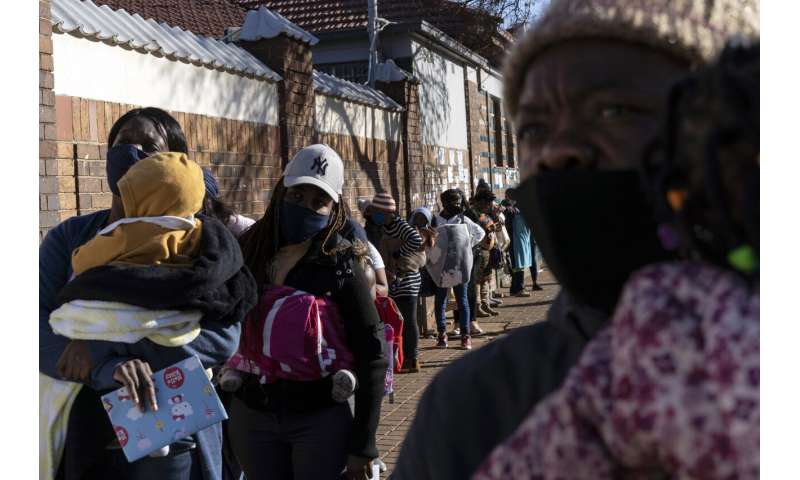
People are queue outside a government clinic in Johannesburg, South Africa, Friday, July 31, 2020. Across Africa and around the world, the COVID-19 pandemic has disrupted the supply of antiretroviral drugs to many of the more than 24 million people who take them, endangering their lives. An estimated 7.7 million people in South Africa are HIV positive, the largest number in the world, and 62% of them take the antiretroviral drugs that suppress the virus and prevent transmission. Some Johannesburg clinics reported decreases of incoming patients picking up their ARV prescriptions, with by 30% to 70%, many fearing long waits in crowded spaces.(AP Photo/Bram Janssen) -
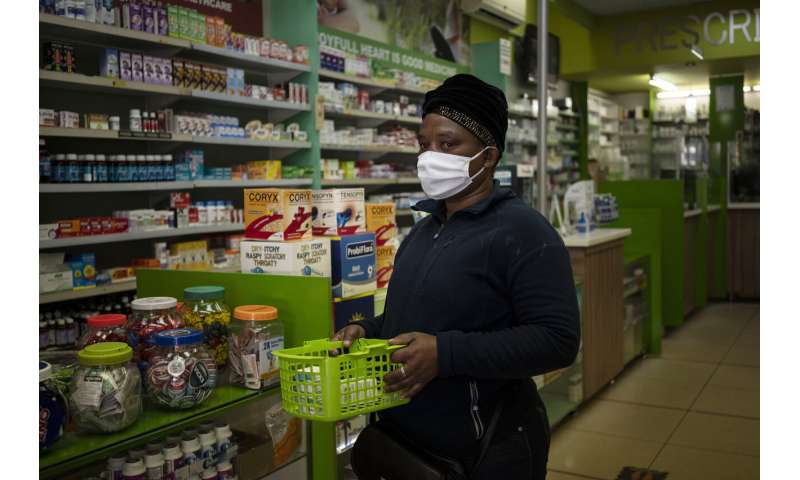
Sister Sylvia Simpwalo pays for HIV medication for her patients in downtown Johannesburg, South Africa, Thursday, July 30, 2020. Across Africa and around the world, the COVID-19 pandemic has disrupted the supply of antiretroviral drugs to many of the more than 24 million people who take them, endangering their lives. An estimated 7.7 million people in South Africa are HIV positive, the largest number in the world, and 62% of them take the antiretroviral drugs that suppress the virus and prevent transmission. (AP Photo/Bram Janssen) -
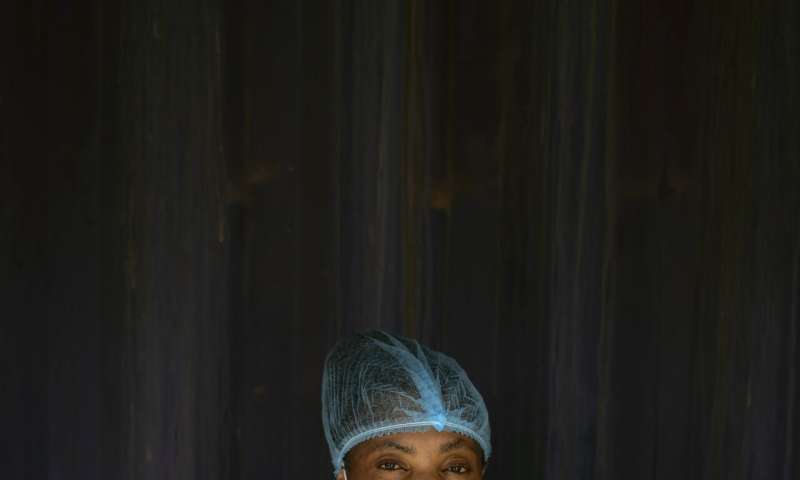
Nurse Nomautanda Siduna poses for a portrait while holding a box with antiretroviral drugs in Ngodwana, South Africa, Friday, July 3, 2020. Across Africa and around the world, the COVID-19 pandemic has disrupted the supply of antiretroviral drugs to many of the more than 24 million people who take them, endangering their lives. An estimated 7.7 million people in South Africa are HIV positive, the largest number in the world, and 62% of them take the antiretroviral drugs that suppress the virus and prevent transmission. (AP Photo/Bram Janssen) -
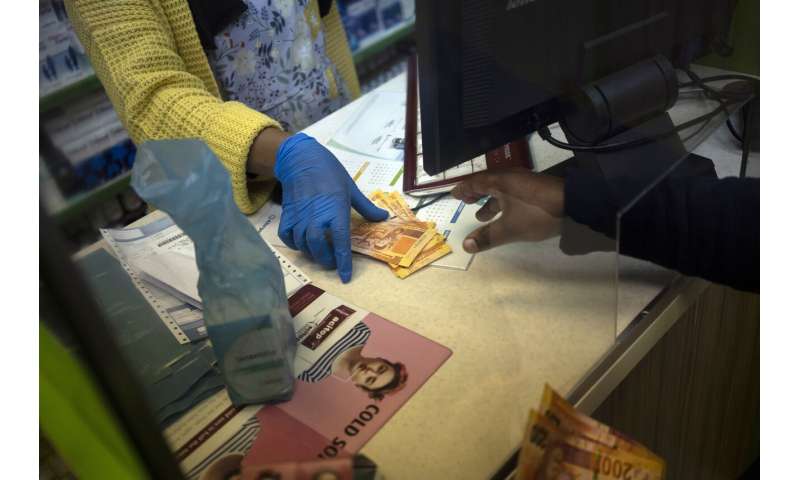
Sister Sylvia Simpwalo pays for HIV medication for her patients in downtown Johannesburg, South Africa, Thursday, July 30, 2020. Across Africa and around the world, the COVID-19 pandemic has disrupted the supply of antiretroviral drugs to many of the more than 24 million people who take them, endangering their lives. An estimated 7.7 million people in South Africa are HIV positive, the largest number in the world, and 62% of them take the antiretroviral drugs that suppress the virus and prevent transmission. (AP Photo/Bram Janssen) -
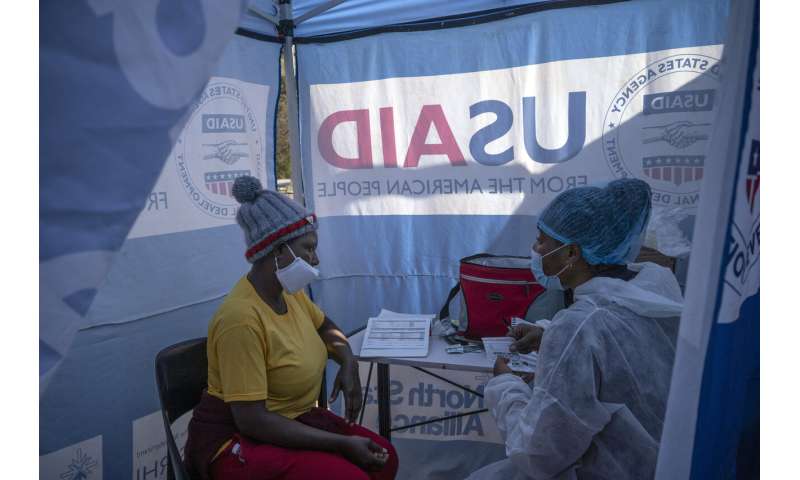
Nurse Nomautanda Siduna talks to a patient who is HIV-positive inside a gazebo used as a mobile clinic in Ngodwana, South Africa, Thursday, July 2, 2020. Across Africa and around the world, the COVID-19 pandemic has disrupted the supply of antiretroviral drugs to many of the more than 24 million people who take them, endangering their lives. An estimated 7.7 million people in South Africa are HIV positive, the largest number in the world, and 62% of them take the antiretroviral drugs that suppress the virus and prevent transmission. (AP Photo/Bram Janssen) -
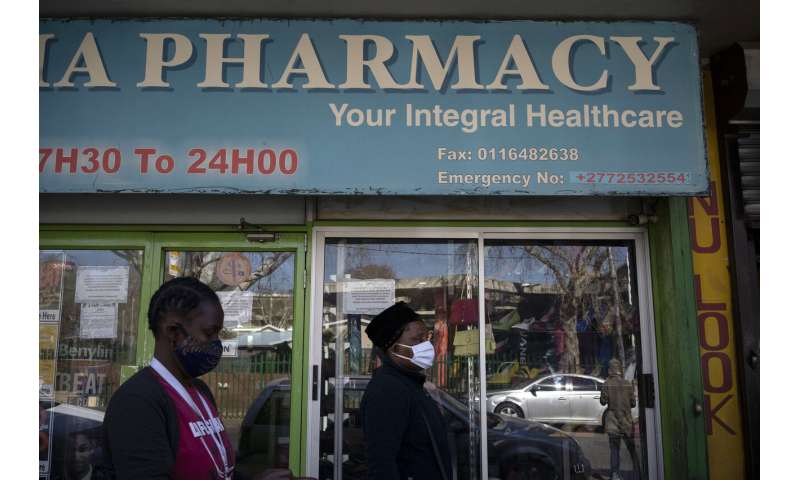
Sister Sylvia Simpwalo, right, leaves the pharmacy where she bought HIV medication for her patients in downtown Johannesburg, South Africa, Thursday, July 30, 2020. Across Africa and around the world, the COVID-19 pandemic has disrupted the supply of antiretroviral drugs to many of the more than 24 million people who take them, endangering their lives. An estimated 7.7 million people in South Africa are HIV positive, the largest number in the world, and 62% of them take the antiretroviral drugs that suppress the virus and prevent transmission. (AP Photo/Bram Janssen) -
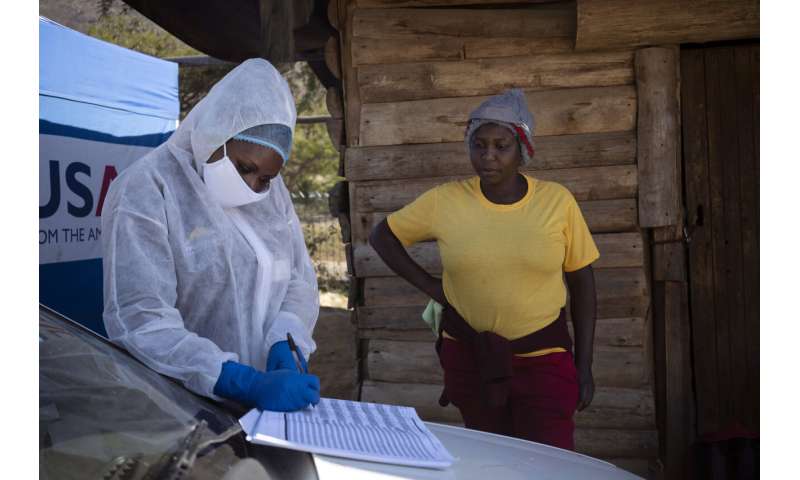
A nurse stands next to a HIV-positive patient outside a gazebo used as a mobile HIV clinic in Ngodwana, South Africa, Thursday, July 2, 2020. Across Africa and around the world, the COVID-19 pandemic has disrupted the supply of antiretroviral drugs to many of the more than 24 million people who take them, endangering their lives. An estimated 7.7 million people in South Africa are HIV positive, the largest number in the world, and 62% of them take the antiretroviral drugs that suppress the virus and prevent transmission. (AP Photo/Bram Janssen)
By chance, she saw the North Star Alliance gazebo in Ngodwana and succeeded in getting a month's supply of antiretroviral drugs.
"If I didn't find them," she said, "I would have died."
© 2020 The Associated Press. All rights reserved. This material may not be published, broadcast, rewritten or redistributed without permission.


















